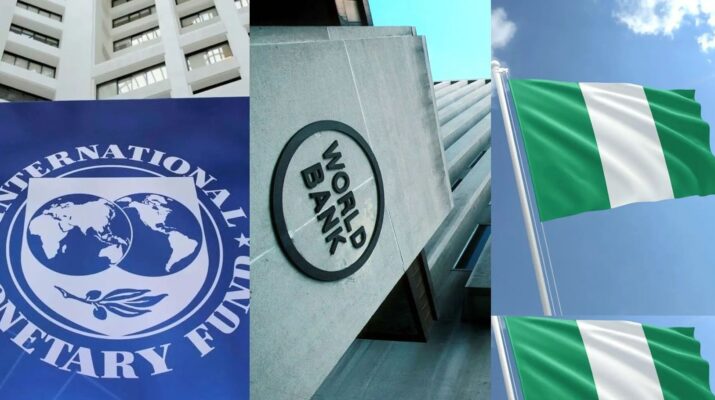The International Monetary Fund (IMF) projects Nigeria’s economic growth at 3.1 per cent in 2025 as oil production falls by 74,000 bpd amid rising business confidence
By Edu Abade
The International Monetary Fund’s (IMF) World Economic Outlook (WEO) for January 2025, has revised Nigeria’s economic growth forecast upward by 0.1 percentage point from 3.1 percent in the October 2024 report to 3.2 percent in the January 2025 report. However, the forecast for 2026 was downgraded by 0.2 percentage point to 3.0 percent.
Key factors driving this downward projection include the anticipated decline in external financing for many Sub-Saharan African countries, the depreciation of the Naira against the dollar and tighter global financing conditions, which will exacerbate debt burdens for developing countries including Nigeria.
For Sub-Saharan Africa as a whole, the IMF projects economic growth of 4.2 percent in 2025, a 0.4 percentage point increase from the 3.8 percent recorded in 2024. Inflation is also expected to decline, reaching 4.2 percent in 2025 and 3.5 percent in 2026.
Nigeria’s GDP forecast is 1.1 percentage points below the Sub-Saharan African countries average. While the projected growth rate is positive, it is too low to significantly boost per capita income.
In its Issue 10 of the Nigeria Economic Update released on Friday, March 28, 2025, the Centre for the Study of the Economies of Africa (CSEA), expressed reservation that the moderate growth projection is likely to be undermined by long-term risks, particularly the unpredictable nature of the exchange rate, which deters investment decisions.
Additionally, Nigeria’s public finances remain vulnerable if borrowing costs stay high and revenue generation remains weak. Therefore, the government must carefully manage inflation and strengthen tax administration processes to enhance domestic revenue collection.
Nigeria’s Crude Oil Production Falls By 74,000 bpd
Nigeria’s oil production declined to 1.4 million barrels per day (mb/d) in February 2025, down from 1.5 mb/d in January 2025, the March report of the Organisation of the Petroleum Exporting Countries (OPEC) has revealed.
Following the development, the oil cartel expressed concern that the output falls short of its production quota of 1.5 mb/d for Nigeria and remains significantly below the country’s 2025 benchmark target of 2.06 mb/d.
The decline in oil production is attributed to poor infrastructure, crude oil theft, pipeline vandalism, and regulatory challenges that have delayed critical reforms in the oil sector. These persistent issues not only hinder production capacity but also deter potential investors from injecting much-needed capital into the industry.
In its Issue 10 report, the Centre for the Study of the Economies of Africa (CSEA), argued that the implications of reduced oil output for the Nigerian economy are severe, as crude oil remains the primary source of export earnings and government revenue. Lower production often results in reduced government income, delays in infrastructure projects, and increased borrowing to cover fiscal deficits, further exacerbating Nigeria’s economic vulnerabilities.
To address these challenges and meet production benchmarks, the government must enhance security at oil facilities, invest in modernising oil infrastructure and implement policies that attract investment in key areas of the sector. Strengthening regulatory frameworks and ensuring transparency will also be crucial for revitalising Nigeria’s oil industry.
Business Confidence Rises In February 2025
Insights from the Business Expectations Survey Report of the Central Bank of Nigeria (CBN) has revealed that overall business confidence in the macro-economy increased in February 2025, with all sectors expressing optimism across all the reviewed periods. Firms indicated a collective optimism rate of 19.7 points for the current month, 25.0 for the next month and 37.7 for the next three months.
Disaggregated by sector, all sectors expressed confidence in their operations, with mining and quarrying leading at 16.0 points, agriculture at 8.6 points, and manufacturing at 6.8 points. However, certain indices, such as the financial condition index and credit access index, stood at -0.4 and -8.8 points, respectively, highlighting key constraints businesses face.
This optimistic business outlook stems largely from expectations of exchange rate improvement, driven by the recent introduction of the Electronic Foreign Exchange Matching System, which has enhanced transparency and efficiency in the foreign exchange market and stabilised the Naira in January 2025.
High business confidence is expected to spur increased investment and job creation, particularly in the manufacturing and agriculture sectors. Additionally, optimism in the agriculture, industry, and services sectors suggests potential for increased output, which could positively impact GDP growth.
The Centre for the Study of the Economies of Africa (CSEA), therefore, recommended that the government and financial institutions should implement policies that improve credit availability, enhance electricity supply, and reduce tax burden on businesses, particularly in manufacturing, agriculture and mining sectors.




